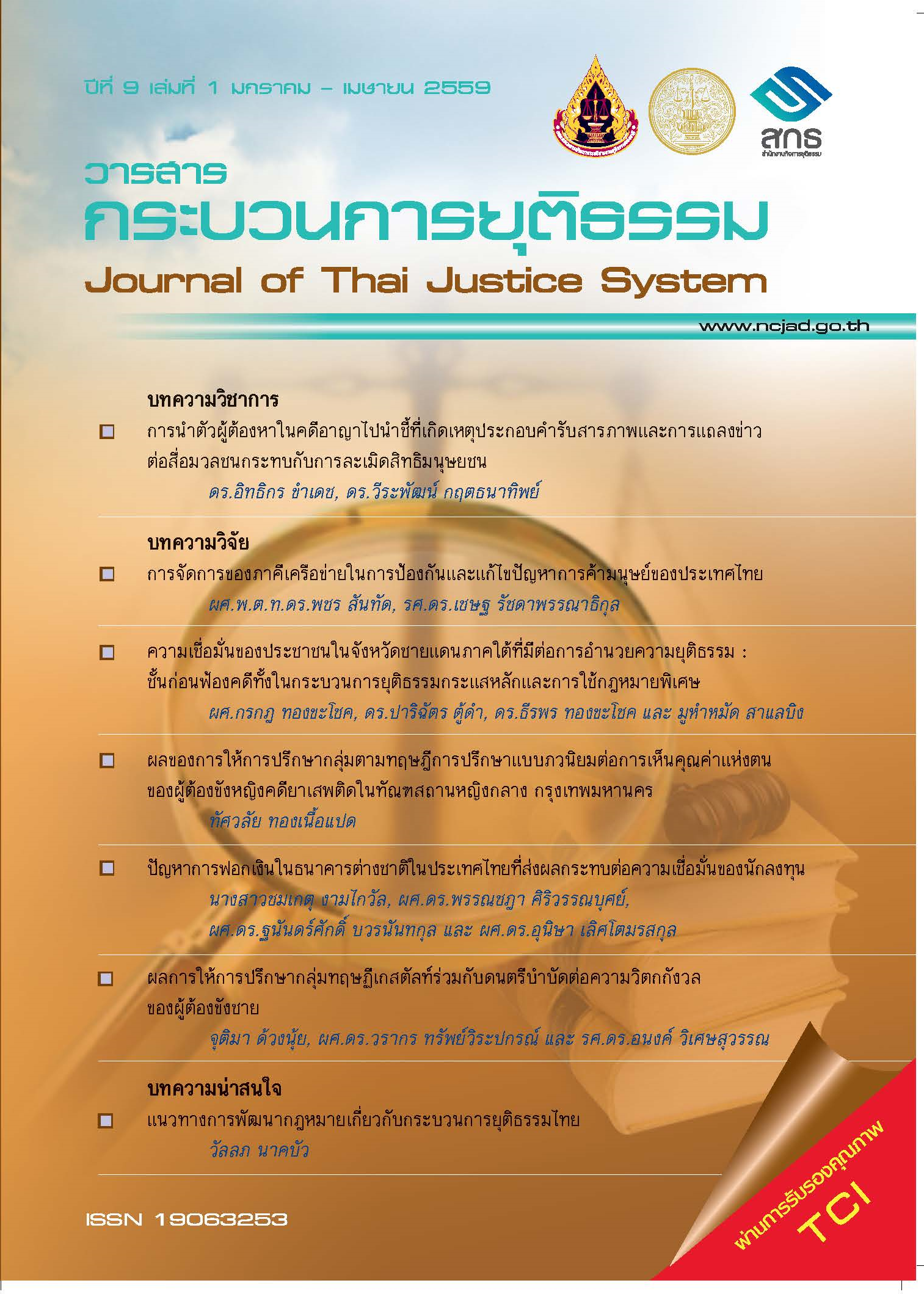การนำตัวผู้ต้องหาในคดีอาญาไปนำชี้ที่เกิดเหตุประกอบคำรับสารภาพและการแถลงข่าวต่อสื่อมวลชนกระทบกับการละเมิดสิทธิมนุษยชน
Main Article Content
บทคัดย่อ
การที่เข้าหน้าที่ตำรวจหรือพนักงานสอบสวนนำตัวผู้ต้องหาควบคุมตัวในคดีอาญา ไปทำแผนประกอบคำรับสารภาพหรือนำชี้ที่เกิดเหตุประกอบคำรับสารภาพและการแถลงข่าวต่อสื่อสารมวลชน ซึ่งปรากฏเป็นข่าวในหน้าหนังสือพิมพ์รายวันและโทรทัศน์อยู่เป็นประจำ เมื่อไปถึงที่เกิดเหตุเจ้าหน้าที่ตำรวจอาจไม่ได้วางแผนหามาตรการป้องกันที่ดีพอ ทำให้ผู้ต้องหากลับถูกประชาชนหรือญาติผู้เสียหายหรือญาติผู้ต้องหรือผู้ที่มามุงดูเหตุการณ์รุมประชาทัณฑ์หรือทำร้ายยร่างกาย เป็นเหตุให้ผู้ต้องหาได้รับบาดเจ็บ ในบางครั้งถึงแก่ความตาย ทั้งๆ ที่อยู่ในความควบคุมของเจ้าหน้าที่ตำรวจ ถึงแม้ว่าผู้ต้องหาหรือผู้กระทำผิดจะได้กระทำผิดจริงและสมควรได้รับโทษตามกฎหมายก็ตาม แต่ก็มีกระบวนการยุติธรรมที่จะต้องดำเนินการลงโทษอยู่แล้วควรเป็นไปตามขั้นตอนของกฎหมาย ดังนั้น การกระทำของประชาชนหรือญาติผู้เสียหายหรือญาติผู้ตาย หรือผู้ที่มามุงดูเหตุการณ์การปฏิบัติหน้าที่ของเจ้าหน้าที่ตำรวจดังกล่าวรุมประชาทัณฑ์หรือทำร้ายร่างกายจึงเป็นการละเมิดสิทธิมนุษยชนและเป็นการปฏิบัติที่ไม่เป็นธรรมต่อผู้ต้องหาหรือผู็กระทำเป็นการกระทำหรือการละเลยการกระทำอันเป็นการละเมิดสิทธิมนุษยชน ปฏิญญาสากลว่าด้วยสิทธิมนุษยชน และกติการะหว่างประเทศว่าด้วยสิทธิพลเมืองและสิทธิทางการเมือง
ถึงแม้คณะกรรมการสิทธิมนุษยชนแห่งชาติมีข้อเสนอแนะเชิงนโยบายต่อสำนักงานตำรวจแห่งชาติและหน่วยงานที่เกี่ยวข้องในการเน้นย้ำและกำชับไปยังหน่วยงานในสังกัดให้ปฏิบัติตามกฎหมาย ระเบียบ อย่างเคร่งครัด แต่ว่ายังมีการนำตัวผู้ต้องหาในคดีอาญาไปนำชี้ที่เกิดเหตุประกอบคำรับสารภาพและการแถลงข่าวต่อสื่อมวลชนไม่ได้เป็นประโยชน์ต่อการดำเนินคดีและไม่ได้นำมาใช้หลักฐานในการดำเนินคดีและไม่ได้นำมาใช้เป็นหลักฐานในการดำเนินคดีแต่เป็นการประชาสัมพันธ์ผลงานของเจ้าหน้าที่ตำรวจบางคน ควรมีการกำหนดแนวทางในการหาวิธีการทดแทนในการนำตัวผู้ตองหาในคดีอาญาไปนำชี้ที่เกิดเหตุ หรือการจัดทำแผนประทุษกรรม เพื่อเป็นประโยชน์ในการแสวงหาพยานหลักฐาน และการดำเนินคดี รวมทั้งเพื่อป้องกันมิให้เกิดการละเมิดสิทธิมนุษยชน
Article Details
ต้นฉบับที่ได้รับการตีพิมพ์ในวารสาร เป็นลิขสิทธิ์ของวารสารกระบวนการยุติธรรม แต่ความคิดเห็นที่ปรากฏในเนื้อหาของบทความในวารสารกระบวนการยุติธรรม ถือเป็นความรับผิดชอบของผู้เขียนแต่เพียงผู้เดียว
เอกสารอ้างอิง
คณะกรรมการสิทธิมนุษยชนแห่งชาติ. รายงานเรื่องสิทธิในกระบวนการยุติธรรม กรณีการนำตัวผู้ต้องหาในคดีอาญาไปนำชี้ที่เกิดเหตุประกอบคำรับสารภาพและการแถลงข่าวต่อสื่อมวลชน. กรุงเทพมหานคร. 2557
รัฐธรรมนูญแ่หงราชอาณาจักรไทย พุทธศักราช 2550
ปฏิญญาสากลว่าด้วยสิทธิมนุษยชน (Universal Declaration of Human Rights หรือ UDHR)
ประมวลกฎหมายวิธีพิจารณาความอาญา พุทธศักราช 2477
ประมวลระเบียบการตำรวจเกี่ยวกับคดี. สำนักงานตำรวจแห่งชาติ
ภัทรวิทย์ อบสุวรรณ (2550) "การทำแผนประทุษกรรมประกอบคำรับสารภาพในระบบกฎหมายไทย" คณะนิติศาสตร์ มหาวิทยาลัยธรรมศาสตร์
วรวิทย์ ฤทธิทิศ (2535) "ข้อพิจารณาเรื่องแผนประทุษกรรม" วารสารอัยการ ปีที่ 15 ฉบับที่ 178 ธันวาคม 2535


